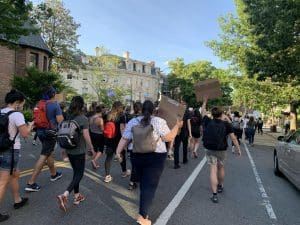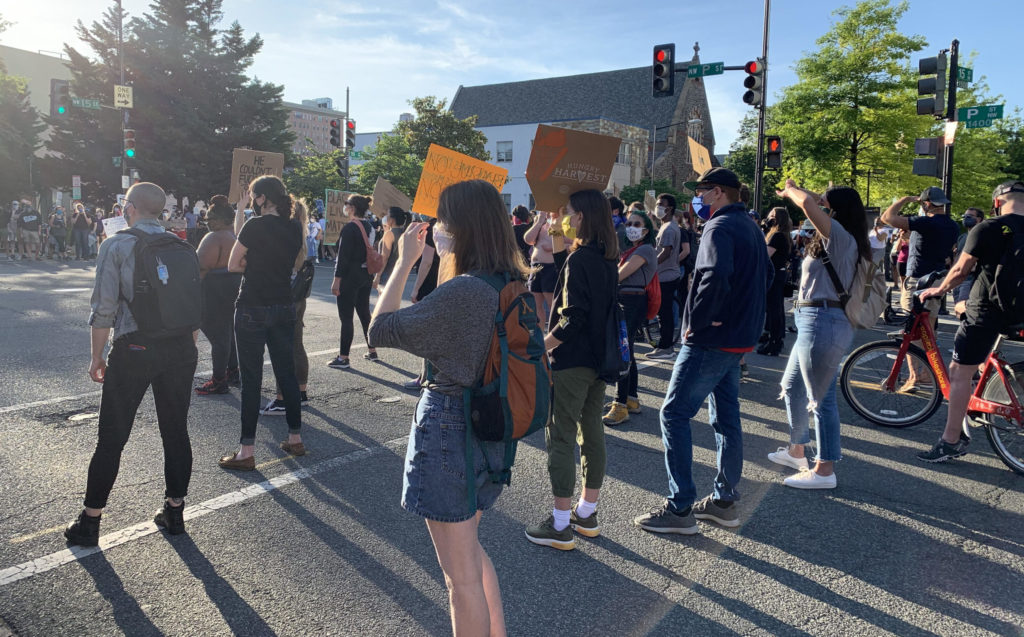Hundreds march through DC to honor black trans man killed by police in Florida
Demonstrators mourned Tony McDade’s death as well as other transgender people of color who have been killed this year.

Hundreds of people marched to the White House on Monday evening to protest the police killing of Tony McDade, a black transgender man, in Florida.
The crowd stopped at different intersections throughout Washington, D.C., on their way to the White House to describe McDade, his life, his personality, and his death. Some also held signs honoring Nina Pop, a black transgender woman who was stabbed to death in Missouri, earlier in May.
Demonstrators initially gathered at Dupont Circle, a little over a mile and a half away, to read the names of other transgender people of color who have been killed in recent months, many of whom are black. Some of those killings have not been solved.
A young black woman in the crowd sang the song “Strange Fruit,” first recorded by Billie Holiday, about the lynching of black people. Another black protester said the Rodney King beating happened when they were just 2 years old and that they had watched police brutalize black people their entire life, and were tired of watching it continue.
One black woman addressed the white protesters in the group directly. “It’s not our work to do this. It’s yours,” she said. “I don’t give a fuck if you’re scared.”

Protesters then marched peacefully through the streets, pausing occasionally to share McDade’s story over loudspeakers.
McDade, 38, was killed by police on May 27. According to WCTV, a local CBS affiliate, the Tallahassee Police Department claimed officers initially approached him because he “matched the description” of a stabbing suspect from earlier that morning.
Police claimed McDade was holding a gun.
They claimed McDade then “made a move consistent with using the firearm” against one officer, who responded by opening fire, killing him.
According to a witness who spoke to a local radio station last week, however, the officer involved allegedly never issued a warning or identified himself prior to the shooting.
“I walked down this way, as soon as I get around this curve, I just hear shots. I see the [person] right behind the tree, but [the officer] just jump out the car, swing the door open and just start shooting,” said Clifford Butler, a resident of the apartment complex where the incident took place.
Butler said he heard seven to eight shots.
“I never heard ‘Get down, freeze, I’m an officer’ – nothing. I just heard gun shots.”
Butler added that the police could have accidentally opened fire on anyone. “It could have been kids, anybody,” he said.
McDade was misgendered and deadnamed in earlier reports of his death. The officer who shot him has not been identified but according to Mother Jones, he is white.
As the outlet noted, Florida law currently allows officers involved in police-involved shootings to be classified as “victims” in order to protect their “privacy.”
McDade was known as “Tony the tiger” by friends, who said he had a “big heart.”
“You have such a big heart… Just your energy would lift my spirits,” one friend wrote online, according to the Human Rights Campaign.
His death is the 12th known death of a transgender or gender non-conforming person this year.
Organizers plan another march on Saturday at 5 p.m. ET.
Protests against police brutality have spread across the country following the death of an unarmed black man in Minnesota. George Floyd was killed by a white police officer on May 25, days before McDade, after the officer, Derek Chauvin, knelt on his neck for nearly 10 minutes despite pleas from Floyd that he was unable to breathe.
An independent autopsy showed Floyd died from “asphyxiation from sustained pressure” related to Chauvin’s actions.
Protesters have also marched in the streets calling for justice for Breonna Taylor, a 26-year-old black EMT who was shot and killed by a group of Louisville, Kentucky, police officers on March 13. The officers had entered Taylor’s apartment without identifying themselves and began shooting after Taylor’s boyfriend, believing them to be burglers because they were not wearing uniforms, opened fire on them using his legal firearm.
LGBTQ advocacy groups are now calling attention to McDade’s death. The Human Rights Campaign released a statement on Friday demanding “accountability and answers.”
“While these deaths are visible due to recordings and social media, we know far too many go completely ignored,” said Tori Cooper, HRC director of community engagement for the Transgender Justice Initiative. “Black people, LGBTQ people, and especially all LGBTQ people of color are at greater risk for violence every day in this country. This must end. Our hearts are heavy as we mourn with Tony’s family and friends.”
LaLa Zannell, trans justice campaign manager for the ACLU, also released the statement.
“Tony McDade should be alive today,” Zannell said. “And in life and in death he should be recognized as his true self: a man … As we mourn the deaths of multiple Black people at the hands of police in recent weeks, we must not forget the Black trans people who have been targeted by law enforcement for decades.”
Monday’s protest took place on the same day that police attacked a group of peaceful demonstrators outside the White House. Federal officers reportedly tear-gassed and fired rubber bullets at the crowd and media covering the event, in order to clear a path for Donald Trump, who was headed to a nearby church for a photo op.
Published with permission of The American Independent Foundation.
Recommended

SC governor to sign bill banning hormone therapy for transgender youth into law
Treatments for youth already taking the drugs could be gradually taken off them through Jan. 31
By Skylar Laird, South Carolina Daily Gazette - May 09, 2024
Alaska House committee advances, expands proposal to bar trans girls from girls sports
Amended bill would add elementary, middle school and collegiate sports to limits in place for high school
By Claire Stremple, Alaska Beacon - April 16, 2024
Bills targeting trans people are on the rise nationwide and in Alaska — most focus on children
House committee advances legislation that would restrict the rights of Alaska trans kids
By Claire Stremple, Alaska Beacon - April 01, 2024














































































